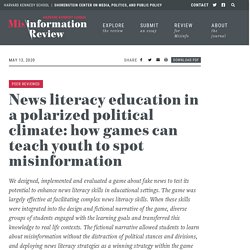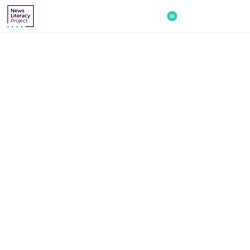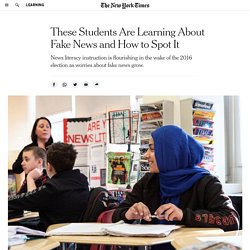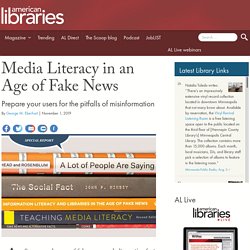

*Twitter thread from Sam Wineburg. *Get Smart About Memes. *A Deep Dive into Deep Fakes: Media Literacy in a World Where Seeing Is no Longer Believing. *Deepfakes Explained: The Best of 2019, How They're Made & How to Spot Them. *Evaluating Photos & Videos: Crash Course Navigating Digital Information #7.
*Data & Infographics: Crash Course Navigating Digital Information #8. *News literacy education in a polarized political climate: how games can teach youth to spot misinformation. We designed, implemented and evaluated a game about fake news to test its potential to enhance news literacy skills in educational settings.

The game was largely effective at facilitating complex news literacy skills. When these skills were integrated into the design and fictional narrative of the game, diverse groups of students engaged with the learning goals and transferred this knowledge to real life contexts. The fictional narrative allowed students to learn about misinformation without the distraction of political stances and divisions, and deploying news literacy strategies as a winning strategy within the game allowed students to articulate and practice these skills.
However, teacher preparation for game-based learning mattered, and additional support is needed for integrating such games into school curricula. Research Questions. *Geolocation/Where In Eart: The steps of sleuthing for accuracy. How do you know that the image you’re seeing online is truly what someone says it is?

There are ways to suss out the facts. Look.Look again, more closely.Look at its origins.Look at it from a big-picture perspective. Taking those four steps can help you discover whether an image is what someone says it is — so you’re not fooled into believing or sharing misinformation. Look. Observe the details. First Draft, an international nonprofit addressing issues of truth and trust in the digital age, also has an overall primer that lets you hone your powers of observation by giving you the opportunity to practice your online sleuthing skills. The most important step to take to know what’s real, of course, is the one that leads you to these investigative tools to start with.
Full House of Mustaches - Nick Offerman [deepfake] Thing 12: News Literacy - Cool Tools for School. Center for News Literacy – Bringing crucial critical thinking skills for the 21st century to teachers and students. News Literacy Resources for Classrooms. Georgia student sees impact of news literacy education — News Literacy Project. As the COVID-19 pandemic began delivering a surge of misinformation to our social media feeds and inboxes, a student in Denise Wood’s Honors World Literature and Composition class emailed her.

“I thank you for teaching us about misinformation last semester. It has helped a ton in recent days as I see loads of false claims, pseudoscience, and logical fallacies,” sophomore Afnan Ahmad wrote regarding his fall 2019 news literacy instruction. Wood, an educator at Union Grove High School in McDonough, Georgia — outside Atlanta — teaches news literacy using the Checkology® virtual classroom. “I had become very concerned about the credulousness I noticed in my students. But she was not surprised to see Ahmad apply what he learned to critically assess information about COVID-19. Ahmad says Checkology helped him to learn how to filter online content and be more discerning.
And throughout this pandemic he has seen plenty of dubious content. Helping others. The Mind Online: Digital Literacy in the Classroom. These Students Are Learning About Fake News and How to Spot It. Robert White, a government and politics teacher at a high school in Lincoln, Neb., was part of a pilot program for the curriculum and has taught it for the last three semesters.

He says it works. “Most students believed what they saw on a news site, any news site,” Mr. White said. “By the end of the semester, I could see a lot of change — they questioned any media source and did fact-checking. I now have students fact-checking me.” In the last 18 months, another university-level news literacy program, Stony Brook’s Center for News Literacy, has reached out to secondary school staff members and teachers, offering them its summer academy, which runs about four days. The idea of a journalism school now should be “not only teach the journalists of the future, but to prepare the audience of the future,” Professor Schneider said. Media Literacy in an Age of Fake News. After several years of fake news and alternative facts, media literacy is still a challenge.

The 2018 Learning and Prototyping Report showed that news consumers think they are better at media literacy than they actually are. How can libraries help bridge that gap and help their communities get informed? Librarians can ensure patrons make informed decisions in local, state, and national elections by helping them think critically. Libraries of all types can promote media literacy by providing handouts, LibGuides, training, and programs about separating fact from online fiction.
The following resources can assist. The Causes and Effects of “Filter Bubbles” and how to Break Free. Anyone who uses the internet has experienced filtering of information. Due to the massive amounts of material online it is necessary to refine what we see, and this inevitable filtering of information at first glance isn’t a big problem. Eli Pariser, a long-time internet activist, argues that these filtering algorithms are biased, and don’t show content that disagrees with the user.
Filter bubbles, also known as echo chambers were defined in Pariser’s 2011 TED talk titled “Beware online filter bubbles”. Pariser says, “your filter bubble is your own personal, unique universe of information that you live in online. And what’s in your filter bubble depends on who you are, and it depends on what you do. While it is true that filter bubbles are a problem, algorithms don’t explain everything.
In Pariser’s TED talk, he says that at first the internet meant a connection to the world, something that brings everyone together, yet it is doing the opposite. Next, schools. Works Cited Pariser, Eli.